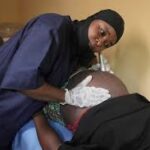World Bank Launches New Health Centers in Northern Nigeria.

Gombe, Nigeria – In a major development for Nigeria’s health sector, the World Bank has handed over 114 revitalized Primary Health Centres (PHCs) in Gombe State, aimed at improving access to quality healthcare in Northern Nigeria. The project is part of ongoing efforts to strengthen primary healthcare delivery and reduce mortality from preventable diseases across rural communities.
A Lifeline for Rural Communities
Northern Nigeria has long faced significant healthcare challenges, with limited infrastructure, shortages of health workers, and high rates of maternal and child mortality. The revitalized PHCs are expected to bridge these gaps by bringing essential services closer to vulnerable populations, particularly in remote villages.
The facilities are equipped to provide maternal and child health services, immunization, treatment of common illnesses, antenatal care, and family planning. Each center has also been fitted with basic diagnostic equipment, solar power systems, and water supply to ensure sustainable service delivery.
“These revitalized primary health centres will provide a lifeline for millions of rural Nigerians who previously had little or no access to modern healthcare. The World Bank’s intervention is a turning point in our journey towards universal health coverage,” said Dr. Habu Dahiru, Gombe State Commissioner for Health.
Why the Focus on Primary Health Centres?
Globally, primary healthcare is considered the foundation of strong health systems, and Nigeria has been struggling to strengthen this critical level of care. According to UNICEF, less than 20% of Nigeria’s PHCs are fully functional, leaving millions without reliable access to essential services.
By investing in PHCs, the World Bank and Nigerian authorities aim to:
-
Reduce maternal mortality by improving access to skilled birth attendants.
-
Boost child survival through immunization and nutrition services.
-
Combat infectious diseases such as malaria, pneumonia, and diarrhoea.
-
Improve access to medicines and basic laboratory testing in underserved areas.
Community Impact and Patient Benefits
For families in Gombe State, the opening of revitalized PHCs means they will no longer need to travel long distances to access basic healthcare. Pregnant women can now receive timely antenatal checkups, while children will benefit from routine immunizations and treatment for common childhood diseases.
Local community leaders have welcomed the project, noting that it will also reduce out-of-pocket health expenses for families who previously relied on costly private clinics.
“Before now, we had to travel to Gombe city for even minor illnesses. Now that the primary health centre in our village has been upgraded, our children can be treated here and women can deliver their babies safely,” said Hauwa Adamu, a resident of Yamaltu-Deba Local Government Area.
Strengthening Nigeria’s Health System
This intervention is part of the Nigeria State Health Investment Project (NSHIP) supported by the World Bank. Beyond infrastructure, the project also focuses on capacity building, ensuring that healthcare workers are trained, motivated, and supplied with the tools needed to deliver effective services.
The World Bank has also emphasized performance-based financing (PBF), where PHCs receive financial incentives based on the quality and quantity of services delivered. This model has been tested in several Nigerian states and shown to improve accountability and patient outcomes.
Challenges Ahead
Despite this progress, experts caution that Nigeria must continue to invest in sustainability and maintenance of these centres. Without consistent funding, drugs, and workforce support, many PHCs could fall into disrepair within a few years.
Other challenges include:
-
Health worker shortages in rural areas.
-
Inadequate state health budgets, with most states spending less than 8% on health.
-
Cultural and social barriers that limit healthcare access, particularly for women.
Analysts suggest that public-private partnerships, digital health platforms, and community engagement will be critical in ensuring long-term success.
World Bank’s Broader Commitment
The World Bank has consistently supported Nigeria’s health sector through projects targeting maternal and child health, nutrition, and disease control. With Nigeria being home to one of the world’s fastest-growing populations, such investments are essential to achieving Sustainable Development Goal 3 (Good Health and Wellbeing).
By focusing on Northern Nigeria—an area disproportionately affected by poverty, insecurity, and weak infrastructure—the World Bank is helping to close the health equity gap between urban and rural populations.
Conclusion
The handover of 114 revitalized Primary Health Centres in Gombe State marks a significant milestone in Nigeria’s quest for stronger, more inclusive healthcare. For millions of families in Northern Nigeria, the project represents hope, access, and dignity in healthcare.
If sustained, this initiative could serve as a model for other Nigerian states, proving that with the right investments, collaboration, and accountability, universal health coverage is achievable.



